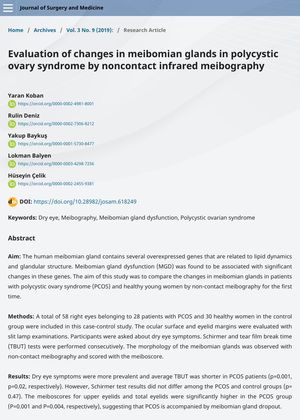Evaluation of Changes in Meibomian Glands in Polycystic Ovary Syndrome by Noncontact Infrared Meibography
September 2019
in “
Journal of surgery and medicine
”

TLDR People with polycystic ovary syndrome have worse meibomian gland and ocular surface conditions.
In a case-control study conducted in 2019, researchers compared the changes in meibomian glands in 28 patients with polycystic ovary syndrome (PCOS) and 30 healthy women using non-contact meibography. The study found that dry eye symptoms were more prevalent and tear film break time (TBUT) was shorter in PCOS patients. However, Schirmer test results, which measure tear production, did not differ between the PCOS and control groups. The meiboscores, which evaluate the morphology of the meibomian glands, for upper eyelids and total eyelids were significantly higher in the PCOS group, suggesting that PCOS is accompanied by meibomian gland dropout. The study concluded that the morphological status of the meibomian gland and the ocular surface were in worse condition in PCOS patients than in the normal controls.



